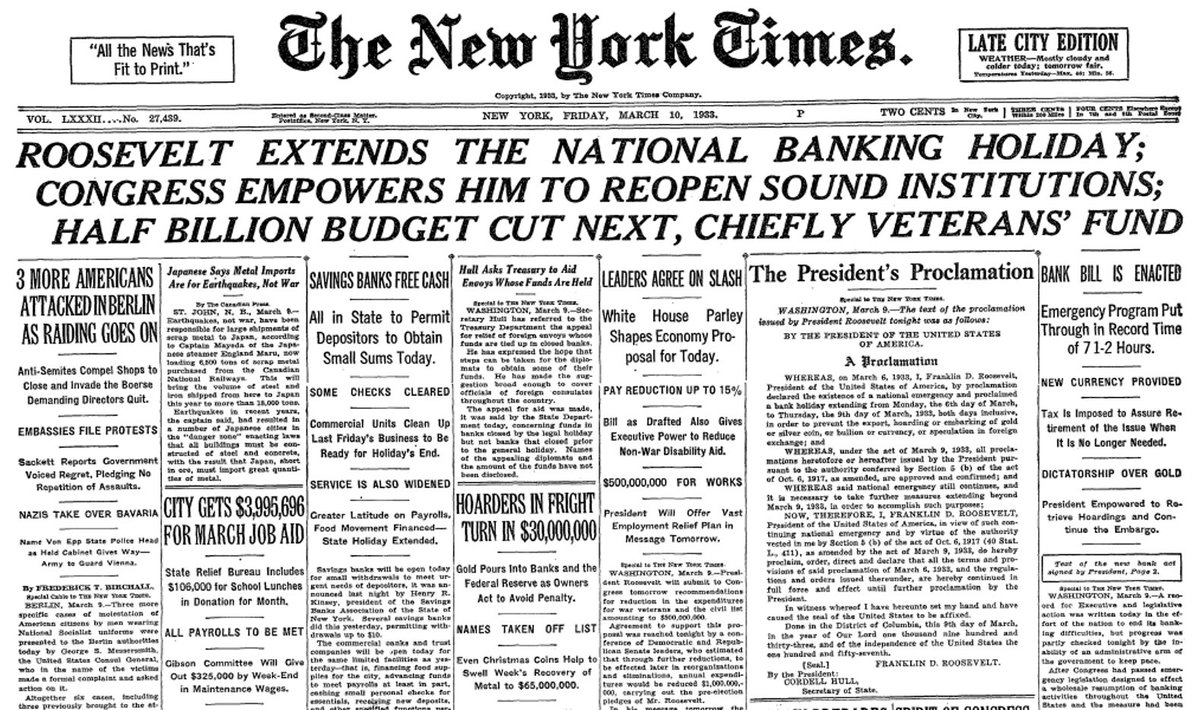
Today in investment law and policy, we’re talking about investment and national security (my favorite topic). The students read treaty text and Continental Casualty v Arg, and also watched a short recorded lecture by me. Other links below were not assigned to students. 1/
First, a little background from my recorded lecture. When folks say that today there is greater overlap between #NatSec & #ISDS, what do they mean? What kinds of measures are they talking about? How would they violate investment rules? 2/
Historically, the primary concern might have been economic sanctions. The US, in particular, has for years applied sanctions, asset freezes, and embargoes under the 1917 Trading with the Enemy Act and the 1977 Int’l Emergency Economic Powers Act (pictured). 3/ 



The US has become creative with IEEPA, applying it beyond interstate conflicts to target suspected terrorists, hackers, & criminal orgs, & expanding security threats to include corruption (Venez) & migration (Mex).
See here by @S_R_Anders @Claussen_K 4/
lawfareblog.com/legal-authorit…
See here by @S_R_Anders @Claussen_K 4/
lawfareblog.com/legal-authorit…
The US, as @henryfarrell @ANewman_forward point out, is well-placed to use sanctions to achieve political advantages, owing to the asymmetric nature of the international financial network. Other states maybe can’t afford to be so adventurous. 5/
direct.mit.edu/isec/article/4…
direct.mit.edu/isec/article/4…
There are other mechanisms, though, which are gaining in popularity. The US has ramped up investment-screening activity via CFIUS, and other countries are following suit. Here’s @sarahbauerle @geoffreygertz 6/
washingtonpost.com/politics/2019/…
washingtonpost.com/politics/2019/…

Then there is the possibility that economic crises create security concerns. ISDS lawyers today may think of Argentina, but historical precedents can be found in 1930s US and Germany, as Clinton Rossiter discusses in Constitutional Dictatorship. 7/
routledge.com/Constitutional…
routledge.com/Constitutional…
Here’s FDR, 1933, invoking the Trading with the Enemy Act of 1917 to address the economic crisis. The emergency proclamation was reprinted on the front page of the Times. (I love the subhead “Dictatorship over Gold,” which can be read out of context about 70 different ways.) 8/ 

More recently, and more relevant to ISDS, is the Argentina Economic crisis and its fallout. This is a good summary of the crisis by Bill Burke-White, who also appeared as an expert for Argentina in at least one of the cases. 9/
papers.ssrn.com/sol3/papers.cf…
papers.ssrn.com/sol3/papers.cf…
What else might present a security concern? Today, it’s pretty obvious that the lines between digital trade and national security are almost impossibly blurred, and not just in the US. Here’s a good piece from @WIRED last month. 10/
wired.com/story/opinion-…
wired.com/story/opinion-…
The Covid-19 pandemic also reveals national security concerns at the intersection of health, supply chains, and industrial policy, as this op-ed from @LawProfJHarris & Sam Estreicher points out. 11/
verdict.justia.com/2020/04/15/bri…
verdict.justia.com/2020/04/15/bri…
Also worth reading, from the outset of the pandemic, is @AntheaERoberts @nicolas_lamp’s excellent piece on the multiple narratives of covid and globalization. 12/ barrons.com/articles/is-th…
And what about climate change, the emergency to end all other emergencies? Should governments like the US declare climate change a security threat, and what would that mean? How would it impact trade/investment? Some good thoughts by @marknevitt here. 13/
justsecurity.org/74914/is-clima…
justsecurity.org/74914/is-clima…
All of these dramatic examples leave out the mundane issues that may trigger actual cases, such as two recent #ISDS cases against India concerning access to a telecommunications spectrum. Ridhi Kabra has a great summary of these cases in ICSID Review. 14/ academic.oup.com/icsidreview/ar…
How do investment treaties handle security issues? Well, historically, many of them don’t say much about security at all. The UK-Argentina BIT says nothing about war/emergency other than Article 4 on compensation for losses. No general exception for security. 15/ 

That leaves us with just the CIL norms of necessity, etc., as reflected in the UN draft articles. There are many cases that turn on these exceptions rather than on treaty text. Here’s a useful piece by @federica_paddeu & Freya Jephcott.
ejiltalk.org/covid-19-and-d…
16/
ejiltalk.org/covid-19-and-d…
16/

The US, however, has always been different. The security exception in the US-Argentina BIT—at issue in several cases—is pretty typical of the US approach in early BITs and FCNs. 17/ 

In my intro lecture, I gave an overview of the interpretive issues, ie scope/effect (“shall not preclude … measures”), objectives (ESI, public order, IP&S), nexus (“necessity”). You could also raise extra-textual issues, eg link with CIL & host state contribution. 18/
The Co. Casualty Award, in my view, is a good discussion on nexus and objectives. I particularly like Para. 181, which emphasizes the political importance of interpreting ESI to cover economic crises. Would this have been written in the same way today, after 4 years of Trump? 19/ 

The Argentina cases gave rise to greater interest in the drafting of security exceptions, as reflected in this excellent study by @UNCTAD. 20/
unctad.org/webflyer/prote…
unctad.org/webflyer/prote…
One such approach, found in the GATT and the NAFTA, uses self-judging terms for at least part of the text ("it considers"), but also specifies more extensively the circumstances in which the exception will be invoked. 21/ 

The US no longer uses this clunky GATT-style version, preferring a more streamlined approach that appears the 2004 and 2012 model BITs. This is the 2004 version. 22/ 

According to a @CCSI_Columbia study from 2016, the US 2004 BIT formulation is the most popular, though many BITs still prefer the specificity offered by the GATT/NAFTA model. 23/
ccsi.columbia.edu/files/2016/10/…
ccsi.columbia.edu/files/2016/10/…
In my lecture, I pointed to a curious footnote that the US has used a few times to stress the self-judging nature of the provision. The US has not used this language recently, though other states have. Here from US-Peru FTA:
24/
24/

This fn emerged in 2007 amid a contest between the admin and Congress over trade policy, including security concerns and a lot of hostile rhetoric surrounding Dubai Ports World. Here’s Rep. Rangel celebrating the Peru FTA footnote.
To be continued…
harvardjol.com/wp-content/upl… 25/
To be continued…
harvardjol.com/wp-content/upl… 25/

Thread continues here:
https://twitter.com/jbentonheath/status/1372240359263207424
• • •
Missing some Tweet in this thread? You can try to
force a refresh






